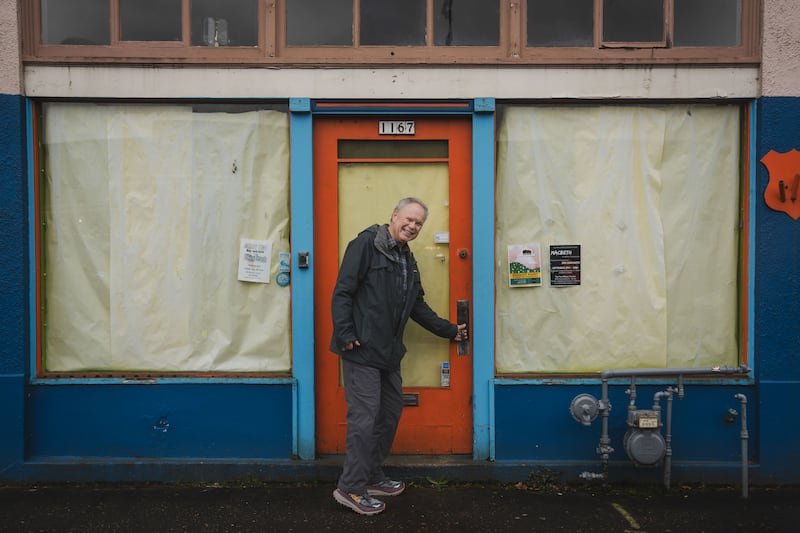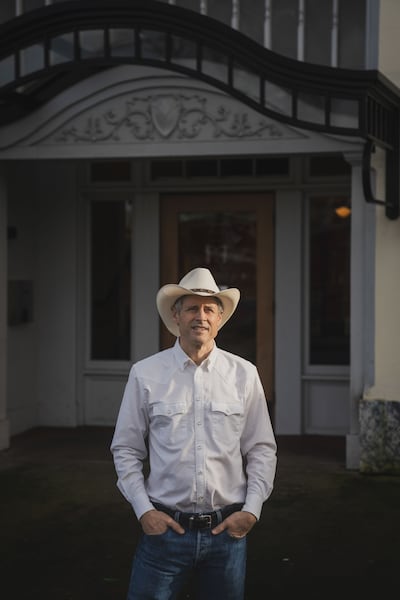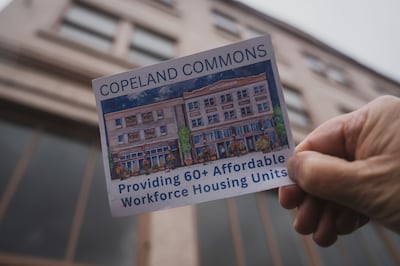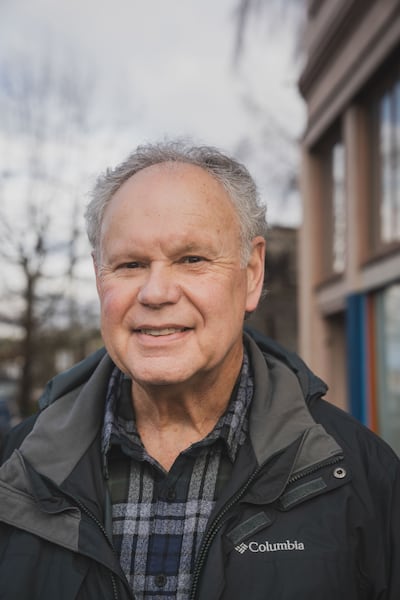ASTORIA, Ore. — In this fishing town at the mouth of the Columbia River, unsheltered homelessness is pervasive. The percentage of people sleeping outside in Clatsop County, according to state figures, is five times higher than in Multnomah County.
Bill Van Nostran, a recently retired minister of Astoria’s First Presbyterian Church, has long struggled with his community’s poverty. He used to hand out $5 bills to people sleeping underneath the city’s 5-mile-long Riverwalk. And the manager at the local McDonald’s would sometimes sell “Pastor Bill” half-price cheeseburgers to give to campers.
Van Nostran, 70, knew that distributing cash and burgers to the army of rough sleepers who huddled along the Columbia River and in Astoria’s town forest was like trying to dam the river with popsicle sticks.
So, in 2019, he founded a nonprofit and asked congregants to open their wallets.
Church members raised about $500,000 to buy the old State Hotel, a three-story building downtown that had stood largely vacant for more than 50 years.
Van Nostran’s vision: A building that once provided cheap lodging for Astoria’s cannery workers, lumberjacks and fishermen could be recast as workforce housing.

Six years later, the project, now called Copeland Commons, is still a dream. Part of the problem, Van Nostran says, is a state government that says it wants more affordable housing but places costly roadblocks in the way.
Earlier this year, Christina Stephenson, the elected commissioner of Oregon’s Bureau of Labor & Industries, ruled that Van Nostran’s project would be subject to the state’s prevailing wage law. That law requires contractors to pay prevailing wage—that is, union wages, for 43 different occupations—on certain public works projects.
BOLI’s ruling came as a blow. Experts say it could cost Van Nostran’s group an extra 10% to 20% on top of the project’s $15 million price tag. As a consequence, the building will have fewer units, won’t be renovated, or will have to wait until he raises more money. (Van Nostran’s group has asked BOLI to reconsider its decision.)
The Copeland Commons project illustrates what developers across the state say is a large and growing problem.
On the one hand, Gov. Tina Kotek has repeatedly said since taking office in 2023 that creating more housing is her top priority. “I am impatient about the pace of progress, and some days just plain angry…that we can’t move faster to get more housing built,” the governor said in her State of the State address in January.
Kotek and the Legislature have indeed injected record amounts of money into affordable housing (see table, below). But with no objection from the governor, BOLI has been interpreting the prevailing wage rules law so broadly that developers are forced to pay above-market wages to build affordable housing for the most needy Oregonians.
Dina Alexander, a lawyer who represents affordable housing developers, wrote Kotek’s top housing adviser a memo last year detailing exactly how the state could generate more housing for less money.
“BOLI has become increasingly predisposed to interpreting Oregon statutes and administrative rules in a manner that subjects projects to prevailing wage rate laws,” Alexander wrote in the June 21, 2024, memo. “BOLI consistently looks for any reason to prevail a project [i.e., require it to pay prevailing wage] with little regard for legal rationale or larger policy questions.”
Alexander says she never got a response.
The Oregon Journalism Project’s reporting has found that BOLI, under Stephenson, regularly mandates that developers pay prevailing wage even when the law suggests many such projects are exempt from the requirement. It’s also clear that developers have laid out a clear path to reform—and more housing—but their efforts have died an unceremonious death in the Capitol.
Critics say Stephenson and Kotek are placing the economic interests of their trade union allies ahead of the state’s greatest need: more housing. Recent studies in Oregon and California showed that requiring affordable housing projects to pay prevailing wage added 9% to 13% to the cost per unit. It’s often more in rural areas, such as Astoria, developers say.
For Pastor Bill, the net effect is that 68 people—that’s the number of units Copeland Commons would provide—will spend more time sleeping under the Riverwalk or in Astoria’s town forest.
“It’s really disappointing,” Van Nostran says.

The Oregon Legislature first passed a prevailing wage law in 1959, mirroring the federal Davis-Bacon Act of 1931.
The goal of both laws was to provide a base rate of pay for workers on projects that received public funding. Public contracting laws generally require agencies to award contracts to the lowest bidder. The requirement that contractors pay local prevailing wage blocked them from driving down wages to unfairly lower their bids and win contracts.
A 2021 review of Oregon’s prevailing wage law prepared by the University of Oregon’s Labor Education & Research Center found higher pay, fringe benefits, apprenticeship programs, and the hiring of minority contractors were pluses of Oregon’s prevailing wage law. The report said the law has been a boon to workers that “delivers pathways into the middle class and boosts the economy.”
Oregon’s prevailing wage law provides an exemption for “projects for residential construction that are privately owned and that predominantly provide affordable housing.” The thinking is, keep construction costs down for low-income housing so more can be built.
Until recently, the Legislature spent little on affordable housing. But developers say projects have become more numerous as state money has flowed, and BOLI has increasingly determined that many affordable housing developments are not exempt from prevailing wage.
If, for instance, a small portion of an affordable housing project contains a commercial use, such as a space for child care or a mental health clinic, BOLI regularly rules that the entire project, including the housing component, must pay prevailing wage.
In other cases, BOLI has ruled affordable housing developers must pay the higher costs of prevailing wage if the previous use of the building was something other than housing. (Part of the reason BOLI dinged Van Nostran’s Astoria project was that the building had previously operated as a hotel. BOLI also determined the project would exceed the four-story maximum height the exemption allows.)
In her 2024 memo to Gov. Kotek’s housing adviser, Alexander, who has represented clients in front of BOLI for more than 20 years, said things have changed recently at the bureau. “BOLI was a solutions-oriented agency,” she wrote, “that sought reasonable resolutions to potential issues.”
Jessica Blakely, director of development for the Salem Housing Authority, says the BOLI of the past often made split determinations on projects: The affordable housing portion would be exempt from prevailing wage, but the developer would pay it on the commercial portion. No longer.
Rachel Mann, a spokeswoman for BOLI, disputes that assertion.
“BOLI’s approach to prevailing wage determinations has remained consistent: We enforce Oregon’s labor laws as they are written,” Mann says. “If there is a perception that more projects are subject to prevailing wage, it is possible that could reflect changes in state law and the increased use of public funding in private developments—but there has not been a shift in agency policy.”
Mark Brenner, co-director of UO’s Labor Education & Research Center, says prevailing wage doesn’t add to project costs but has created better wages and working conditions for hundreds of thousands of workers over time. Brenner thinks making more land available, easing permitting requirements, and lowering the cost of capital would be far more meaningful policy solutions than exempting projects from prevailing wage.
“I just don’t believe it’s a make-or-break lever,” Brenner says.

Developers disagree with him. Tom Brenneke, the president of Guardian Real Estate Services, which has developed affordable housing from Lane County, Ore., to Clark County, Wash., and employed both union and nonunion contractors, says prevailing wage adds to the final price tag more than recent studies suggest. “I think it’s 20% to 25%,” Brenneke says.
Kurt Creager, a former director of the Portland Housing Bureau and later executive VP at the affordable developer Bridge Housing Corp., told lawmakers in 2023 about a 45-unit senior housing development that Bridge built in Cornelius.
BOLI determined Bridge had to pay prevailing wage on the project, “resulting in a 20% to 25% cost premium,” Creager said.
“We are actively pricing construction projects and have three underway in Oregon presently,” Creager added. “The cost premium of 20% to 25% of BOLI commercial wages over private wages has been validated by our contractors within the last two weeks.”
A BOLI ruling on a second Astoria project, one that includes a commercial component, illustrates the difficulty developers face.
Oregon’s oldest city, Astoria was founded as a fur-trading hub in 1811. Its population peaked at about 14,000 in 1920—right before most of downtown burned to the ground.
The fishing and timber industries have dwindled, leaving a smaller population (10,131) and poverty in their place. And about 27 in every 1,000 people in Clatsop County sleep outside.

Although it has reinvented itself as a tourist destination whose leading institutions—Columbia Memorial Hospital, the Columbia River Maritime Museum and the Astoria Public Library—are undergoing major expansions, Astoria is also a city where, for some, economic desperation meets temptation. The city has five times as many cannabis shops per capita as the state average, seven times the number of breweries, and serious issues with mental illness and drugs.
“We have to realize a big part of the issue is opioid addiction,” says Astoria Mayor Sean Fitzpatrick.
The development firm Edlen & Co. recently broke ground along Astoria’s Marine Drive on 33 apartments for people making less than 30% of median family income—i.e., the poorest of the poor.

Fitzpatrick is thrilled that developers are bringing new housing to his city—and that the Elden development would include a Clatsop Behavioral Healthcare clinic offering therapy, treatment for substance use disorder, and skills training for people with “severe and persistent mental illness.”
If the project comprised only housing, it would be exempt from prevailing wage.
But, in a Sept. 17, 2024, determination letter, BOLI Commissioner Stephenson said the clinic—no matter how badly it’s needed—triggers prevailing wage for the whole project.
“Although the project will be privately owned and will predominantly provide affordable housing, the project does not meet the definition of ‘residential construction’ as the project will include nonresidential spaces that are not incidental to the construction of residential units,” the BOLI determination said. “The [affordable housing] exemption does not apply.”
Fitzpatrick says the government decisions on Copeland Commons and the Edlen project are not helpful.
“Any time elected officials interfere with the markets,” he says, “costs will increase dramatically.”

Kotek consistently says she’s doing everything she can to increase Oregon’s housing supply. To be sure, the governor has pressed to streamline zoning and permitting, freed up additional land, and convinced lawmakers to ante up more than $1 billion in new funding for housing.
What Kotek—and Stephenson—seem unwilling to do is confront the power of Oregon’s trade unions. Those unions understandably want their members to be paid as much as possible and to build their ranks through the apprenticeship programs that are part of prevailing wage law.
The law requires that developers pay health care, vacation, pension and apprenticeship benefits, and document them in a certified payroll filed with the state. That’s great for workers, but developers say those requirements dissuade nonunion and smaller subcontractors from bidding for work.
Kotek, of course, won the governor’s race in 2022 with the financial support of organized labor, including trade unions, who gave more than $1.3 million of the $30 million her campaign raised. Kotek declined to answer detailed questions for this story, responding instead with a statement.
“The governor will continue to work on implementing the recommendations of her Housing Production Advisory Council, including having a thoughtful conversation in the future about the application of prevailing wage,” says her spokeswoman Roxy Mayer.
Stephenson is even more in debt to the unions for her job.

When Stephenson ran for BOLI commissioner in 2022, for instance, most of the $1.8 million she raised came from labor groups. Her biggest contributors included the Local 48 Electricians PAC ($200,000), AFL-CIO ($191,000), and the Pacific Northwest Regional Council of Carpenters ($100,000). The labor money even allowed Stephenson to pay back a $25,000 loan she’d made to her own campaign.
Stephenson occupies an unusual position. BOLI staff makes prevailing wage determinations in quasi-judicial cases. It also presides over reconsiderations, although Stephenson’s name is on all decisions. No other statewide elected official wields similar clout with such direct economic impacts.
Mann, Stephenson’s spokeswoman, says asking about union influence “assumes that requests for determinations on prevailing wage are discretionary; they are not. BOLI and Commissioner Stephenson have applied and will continue to apply the laws as they are written to the facts presented before us.”
Mann adds: “If stakeholders want changes that would exempt certain nonhousing uses, that would require legislative action. We are always open to discussions about improving clarity in the law, but our duty is to enforce the statutes as they exist today.”
In recent years, there has been growing pressure to amend the prevailing wage law.
In 2023, affordable housing developers flocked to the Capitol to share their concerns. They noted that numerous affordable housing projects across the state contain empty ground floors. That’s because it’s cheaper to leave the space vacant than to put in some nonhousing function for that space and then have to pay prevailing wage for the entire building.
That’s why, for instance, a Portland apartment complex at 4610 NE 42nd Ave., built by the Native American Youth Association in 2022 for artists and tribal members, has space on the first floor that is neither housing nor commercial.
NAYA hoped to include a gallery where tenants could sell their art. But after learning a commercial use would force the nonprofit to pay prevailing wage on its entire building, the association left the space vacant. NAYA CEO Oscar Arana told lawmakers that was a “lose-lose” proposition.
“It was a missed opportunity for the residents, and the neighborhood,” Arana told lawmakers. “Prevailing-wage commercial construction jobs were not created because we had to exclude the commercial space, and therefore we did not pay prevailing wages for any part of the project.”

Lawmakers drafted the fixes developers suggested, including them in Senate Bill 847. No trade union testified against it, but the section of the bill relating to affordable housing disappeared from the final version.
It’s difficult to determine what happened because lobbyists, though they must register, are not required to disclose their activities (“Elon & Co.,” WW, March 26).
State Sen. Dick Anderson (R-Lincoln City) served as vice chair of the Senate Housing Committee in 2023. Anderson, who still holds that position, thinks labor protected prevailing wage behind closed doors. “The unions killed it,” Anderson says.
In 2023, Anderson and a Democratic colleague, then-Sen. Elizabeth Steiner of Portland, also co-sponsored a bill that would have exempted child care facilities in affordable housing projects from paying prevailing wage. It went nowhere.
“When Sen. Steiner was running for treasurer [in 2024], she told me the unions held a grudge against her for introducing the bill,” Anderson says. “She warned me when I thought about doing it again.” (Steiner has been ill and was unavailable for comment.)

This session, Anderson introduced a similar bill anyway. Early in the session, he told OJP he was confident the bill would at least get a hearing.
That hasn’t happened. “It’s dead,” he said in late March. Anderson says he’s met with trade union representatives to seek common ground. After all, he notes, if a project doesn’t happen because of a BOLI determination, everybody loses.
“Union workers have a need for child care, too,” he says. “I ask them, ‘Is there a place we can agree?’ But they won’t give us anything.”
Robert Camarillo, executive secretary of the Oregon State Building & Construction Trades Council, did not respond to requests for comment. But on March 26, Camarillo testified in favor of a bill that would expand the prevailing wage law to cover construction of prefabricated items made elsewhere and shipped to Oregon building sites.
“Studies show that prevailing wage rate laws help boost investments in registered apprenticeship training programs, increase jobsite safety and worker productivity,” Camarillo said. “This investment in Oregon’s workforce will pay dividends for years to come, ensuring that our state’s construction industry remains a source of opportunity and prosperity for all.”
Oregon’s housing shortage extends beyond Clatsop County across the whole state. But Anderson says despite abundant evidence of that shortage, reforming the prevailing wage law to increase housing supply remains a nonstarter.
“We keep saying we have a housing crisis in this state, but we’ve yet to act like it,” Anderson says. “We just don’t want to take the extreme measures necessary to make progress.”

Bill Van Nostran says he won’t be deterred by BOLI’s determination that Copeland Commons must pay prevailing wage.
The developer working on Copeland Commons, Innovative Housing Inc., is seeking a reconsideration from BOLI. That’s rarely successful, developers say, since the bureau, rather than an independent evaluator, merely reviews its own decision. (If developers disagree with BOLI’s decisions, they can seek review from the Oregon Court of Appeals.)
Neither Van Nostran nor many of the developers interviewed for this story blame trade unions for trying to maximize compensation for their members. They recognize that’s the unions’ role.

Their frustration comes with leaders—Kotek, Stephenson and lawmakers—whose job it is to make hard choices between competing interests. If building more housing faster is truly the state’s top priority, that means maximizing the amount of housing built from every public dollar.
But people who are poor or homeless or sleeping under Astoria’s Riverwalk don’t make campaign contributions. Neither do pastors.
“I was a member of the governor’s campaign committee when she first ran for state office from North Portland,” Van Nostran recalls, “even embraced her when I saw her at a campaign stop this last go-around. I send letters to her office, but Tina has bigger fish to fry.”
This story was produced by the Oregon Journalism Project, a nonprofit newsroom covering rural Oregon.
